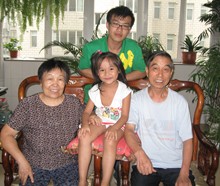Another View
Sunday, January 18, 2009 03:57 AM
Opinion250 has invited Ning Ma, a Chinese student studying English at UNBC, to write a weekly article for us. We thought this would be helpful to Ning as he strives to improve his English skills, and helpful to us as we can see how others view Prince George, B.C. and Canada. Consider this an educational opportunity for all involved, and that is why we won't be inviting comment on this weekly submission. We are interested in your thoughts on things Ning should experience and write about. We are also providing the same article in Mandarin as an opportunity for Ning's family and friends to learn more about us.
-Elaine Macdonald
Chinese family obligations
by Ning Ma
Today I would like to talk about the differences between Chinese and Canadian family relationships between children and parents. In Canada, young people and older people’s relationships are less than Chinese. A Chinese person must have to pay a lot of painstaking care for his parents and his children in his life.
In Canada, I found that young adults are usually working to earn money to ensure their own expenses, and many people live in a different place than their parents. Then they make money but are not obligated to support the parents.
This is not the case in China. 

Young people in China must have obligations to their parents. It is common for parents to help children by providing for the future. Youth will receive the help of family and have some money from their parents.
( at right, Ning visits his grandparents)
Most of the Chinese youth do not work during the period when they study at a university because their family would provide sufficient money to help them complete their studies. When their parents are old, young people must go to take care of their parents’ lives. For example, youth will meet their parents every weekend and if the parents are sick or lose their ability to take care of themselves, their children will live with and take care of the parents.
Obligation to look after a person’s parents is an important tradition in Chinese culture. Chinese people attach great importance to children’s obligations to parents. In ancient China obligation is one of the most basic standards of morality. Sometimes meeting obligations were the credentials for the selection officials of governments.
Confucius said: "a person should look after their parents at home and should revere elders in society". His philosophy was regarded as orthodox ideology for more than two thousand years in China. Even though Confucius philosophy is not always deemed as truth, Chinese culture still abides by the philosophy of being obligated to parents. If a person in China has a reputation for not looking after their parents or disrespecting elders, he will make people feel that he is a bad person. For example, in Beijing if there are a lot of people on a bus and then an elder goes on the bus, soon a young person will stand up and give his seat to the elder.
In my family, my parents and grandparents do not live together, but every weekend we drive to the grandparents’ home and have dinner with them. We will make them not feel lonely and know we always miss them.
Although each country has different cultures, the "family" and "relatives" in any country are extremely important. When you are young, you should spend much time to make your parents happy and repay them for your upbringing. When you are old your children will give you happiness and look after you. Is this not the virtuous circle of harmony? Everyone should think about this. Do not forget your parents even though you are so busy. Sometimes just a phone call or a greeting is very important in the parents’ heart.
中国的“孝”道
今天我要谈一下中国与加拿大在家庭中青年与老年的关系是不一样的,加拿大青年人与老年人之间的义务关系不如中国明显,中国人要付出更多为了自己的后代和先代。
在加拿大我发现青年成年之后一般都会打工挣钱来保证自己的开销,并且很多人与父母分开居住寻找自我独立,然后挣钱,青年人并没有义务赡养老人。
但是在中国不是这样,在中国的青年一般会受到家庭最大限度的帮助与提供经济生活援助。大多数中国青年在大学期间不会去打工挣钱,因为家庭会提供充足的前来帮助他们完成学业,并且可能为未来生活提供资金帮助,但是中国的青年有义务要孝顺父母,当自己的父母老到时候,年轻人要去照顾他们父母的生活,如果他们病了或是失去自理能力,子女会和他们住在一起照顾他们。
孝是中国很要的一项义务在中国传统文化中,中国人很重视孩子对父母的孝顺。在中国古代几千年历史中,孝是一个人道德的最基本标准。有些时候官员的选拔的凭据就是这个人的孝。孔子说过:“弟子入则孝,出则弟”。他的思想在中国被视为正统思想有两千多年,所以这个文化所形成的风气一直影响到了现在。在中国如果一个人背负了不孝的名声,或者对老人不尊敬都会让人们觉得他不是个道德完善的人。比如在北京的公交车上如果有一个岁数大的人上车,而这时车上空座位已经坐满,绝大多数情况下会很快有年轻人站起来给老人让座。
在我的家庭中,我的父母不和我的祖父母住一起。但是我们每个周末都要开车去祖父母的家,和他们一起吃饭,看望他们不让他们觉得孤单,让他们知道我们时刻想念着他们。
尽管每个国家的文化会有不同,但是“家庭”与“亲人”在任何国家都是极为重要的。当你年轻的时候花些经历去让你的父母有一个快乐的晚年,报答他们的养育之恩,而在自己老了之后,会有自己的孩子来给你快乐,这不是一个和谐的良性循环吗?所以我觉得人人都应该Previous Story - Next Story
Return to Home









